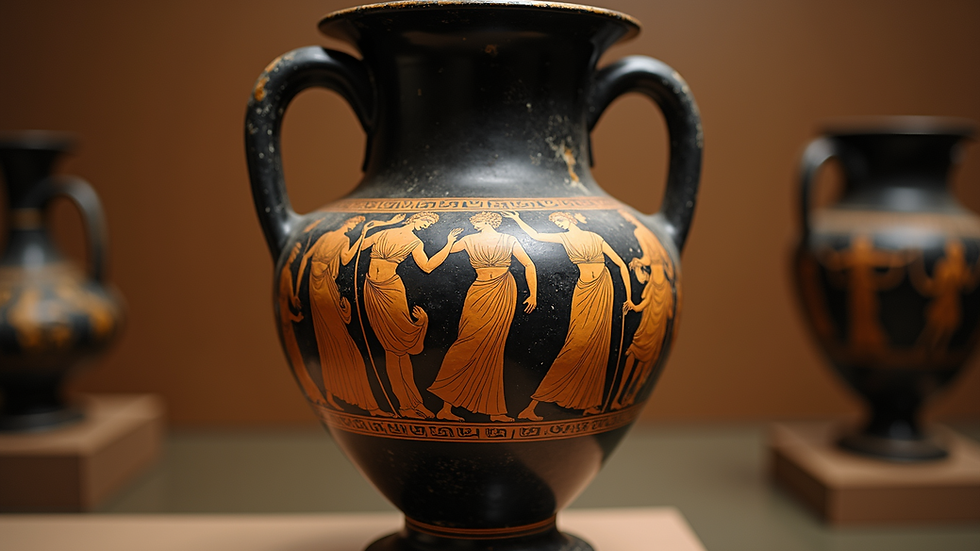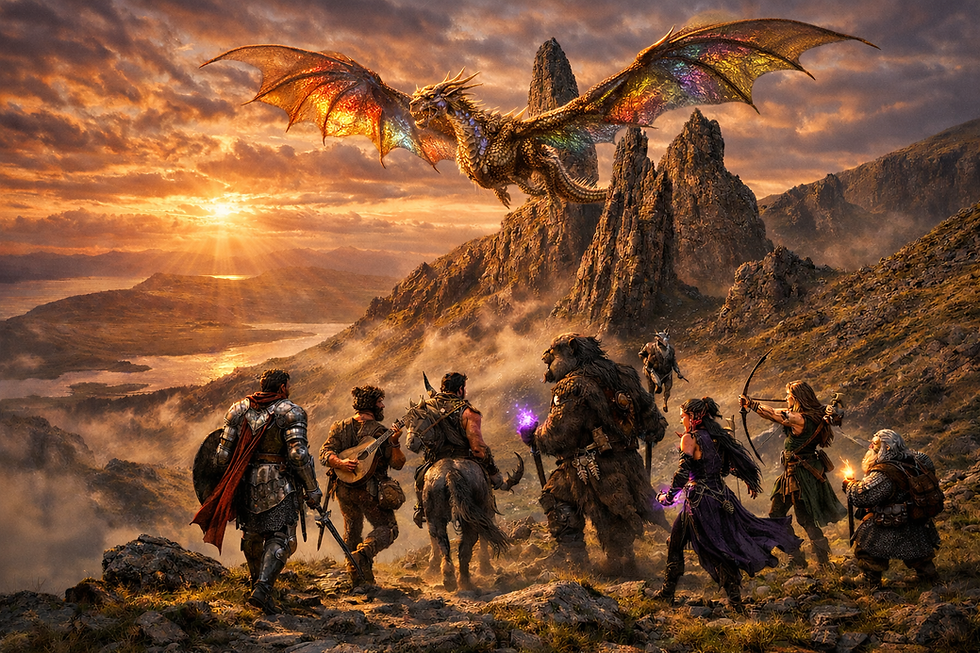The Muses in Greek Mythology
- Sarah Jordyn

- Sep 15, 2025
- 4 min read
When I first dove into the world of tabletop RPGs, I found myself craving stories that spark creativity and bring characters to life. That’s when I stumbled upon the enchanting Muses of inspiration from Greek mythology. These divine figures aren’t just ancient myths; they’re a treasure trove of ideas and energy for anyone crafting tales or worlds. Ready to explore how these legendary goddesses can ignite your imagination? Let’s jump right in!
Meet the Muses of Inspiration: Who Are They?
The Muses are nine sisters, each a goddess of a different art or science. They’re the ultimate creative squad, inspiring poets, musicians, dancers, and even historians. Imagine having a personal cheerleader for every creative project you tackle! Here’s a quick rundown of these fabulous ladies:
Calliope - Muse of epic poetry. She’s the queen of storytelling and heroic tales.
Clio - Muse of history. She helps you remember and retell the past with flair.
Erato - Muse of love poetry. She’s all about romance and passion.
Euterpe - Muse of music and lyric poetry. Think of her as the soundtrack to your adventures.
Melpomene - Muse of tragedy. She brings depth and emotion to darker stories.
Polyhymnia - Muse of sacred poetry and hymns. She inspires spiritual and serious themes.
Terpsichore - Muse of dance. She’s the rhythm behind every graceful move.
Thalia - Muse of comedy and pastoral poetry. She adds humor and lightness.
Urania - Muse of astronomy. She’s the star-gazer, perfect for cosmic tales.
Each Muse has her own personality and domain, making them perfect muses (pun intended!) for different storytelling needs. Whether you want to craft a tragic backstory or a hilarious side quest, there’s a Muse ready to help.

How the Muses of Inspiration Can Boost Your RPG Storytelling
Here’s where things get exciting! These Muses aren’t just dusty old myths. They’re alive in the way we create stories today. When you’re building a campaign or character, calling on the Muses can:
Spark fresh ideas: Stuck on a plot? Think about which Muse fits your theme and let her guide you.
Add depth to characters: Maybe your bard worships Euterpe, or your scholar NPC is inspired by Clio.
Enhance world-building: Use Urania’s cosmic knowledge to design star maps or celestial events.
Balance tone: Mix Melpomene’s tragedy with Thalia’s comedy for a rich emotional palette.
For example, if you’re running a campaign set in a mystical realm, you might invoke Polyhymnia to inspire sacred rituals or Terpsichore to choreograph a festival dance scene. These little touches make your game world feel alive and vibrant.
And hey, if you want to dive deeper into the greek mythology muses, there’s a fantastic resource that breaks down their stories and symbolism in detail. It’s a goldmine for any storyteller!

What is the story behind the Muses?
The Muses are daughters of Zeus, the king of the gods, and Mnemosyne, the goddess of memory. This lineage is no accident - creativity and memory go hand in hand! According to myth, Zeus and Mnemosyne spent nine nights together, and from this union, the nine Muses were born. Each Muse embodies a different aspect of the arts and sciences, symbolizing the divine inspiration that fuels human creativity.
In ancient Greece, poets and artists would call upon the Muses at the start of their work, asking for their blessing and guidance. This tradition is echoed in epic poems like Homer’s Iliad and Odyssey, where the poet famously begins by invoking a Muse to help tell the story.
The Muses were also associated with Mount Helicon and Mount Parnassus, places considered sacred to them. These mountains were thought to be sources of poetic inspiration and artistic energy. Imagine standing there, feeling the creative power of the Muses flowing through the air!
This story behind the Muses reminds us that creativity is a gift, one that connects us to something greater than ourselves. It’s a beautiful idea to carry into your own storytelling and game design.

Practical Ways to Use the Muses in Your Tabletop RPGs
Alright, now that you know who the Muses are and their story, how can you actually use them in your games? Here are some actionable tips:
Create NPCs inspired by the Muses: Imagine a bard who channels Calliope’s epic storytelling or a historian priestess devoted to Clio. These characters can offer quests, knowledge, or magical boons.
Design magical artifacts: A lyre blessed by Euterpe that enchants listeners, or a scroll written under Polyhymnia’s influence that reveals sacred secrets.
Incorporate Muse-themed quests: Players might need to seek the favor of Thalia to lift a curse of gloom with laughter or consult Urania to navigate a starry prophecy.
Use Muses as metaphors: When a player’s character hits a creative block or moral dilemma, you can narrate a vision or dream where a Muse appears to guide them.
Build festivals or rituals: Celebrate Terpsichore’s dance or Melpomene’s tragic plays in your game world’s culture, adding immersive flavor.
By weaving the Muses into your storytelling toolkit, you add layers of meaning and inspiration that resonate deeply with players. Plus, it’s just plain fun to bring these mythic figures to life!
Why the Muses Still Matter Today
You might wonder, why bother with ancient goddesses in a modern game? Here’s the thing - the Muses represent something timeless: the spark of creativity that lives in all of us. Whether you’re spinning a yarn around the table or crafting a sprawling campaign, tapping into that energy can transform your work.
The Muses remind us that creativity isn’t just about talent; it’s about connection - to history, to emotion, to the world around us. They encourage us to explore new ideas, embrace different art forms, and celebrate the joy of creation.
For educators and creators in the TTRPG community, the Muses offer a rich source of inspiration and inclusivity. Their diverse domains show that creativity comes in many forms, and everyone’s voice matters. So next time you’re stuck or looking for a fresh angle, remember the Muses are just a story away.
If you want to explore more about these fascinating figures and how they can enrich your storytelling, check out this detailed guide on the greek mythology muses. Trust me, it’s a game-changer!
Happy storytelling, and may the Muses inspire your next epic adventure!









Comments